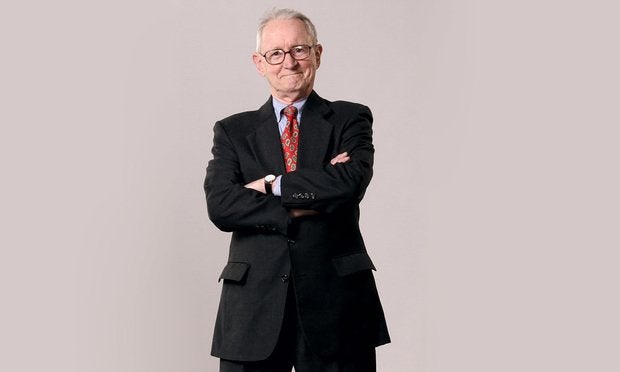John J. Gibbons ’50, a former federal judge who dedicated his more than five-decade career to upholding the rule of law in the United States, died Dec. 9. He was 94.
Gibbons served as a judge on the United States Court of Appeals for the Third Circuit from 1970 to 1990, including three years as chief judge. He returned to private practice after his service on the federal bench.
In 2004, Gibbons represented Guantánamo Bay detainees in the landmark Supreme Court case Rasul vs. Bush. He challenged the government’s continued detention of 660 men held at the Guantánamo Bay Naval Base in Cuba, arguing that the administration of President George W. Bush could not hold foreign citizens without trial and legal representation.
Lawyers representing the administration responded that the courts had no jurisdiction over the base because the detainees were not American citizens and not on American soil. Gibbons argued that the United States held sovereignty over the base through a perpetual lease with Cuba. In a 6-3 decision, the Court decided in favor of the detainees.
Gibbons told the New Jersey Law Journal in 2004, “It’s clear that what [the government was] doing was intentionally creating a black hole where they could get away with everything, with the public never even knowing.”
In a 2004 interview about the case in the New York Times, he said: ”The difference between us and a good part of the rest of the world is that we have been dedicated to the rule of law,” he said. ”It is important that people like me fight to preserve that tradition.”
A native of New Jersey, Gibbons earned a bachelor’s degree from Holy Cross in 1947 and a law degree from Harvard in 1950. After graduating from HLS, he joined the Newark, N.J. law firm of Crummy & Considine. He worked for the firm for 20 years, serving as a named partner, until President Richard Nixon nominated him to the bench in 1969.
In the summer of 1967, a deadly riot broke out in Newark that left 26 people dead and more than 700 injured. Police arrested more than 1,400 people.
Gibbons, who was then serving as president of the New Jersey State Bar Association, persuaded the authorities in Newark to provide access to the courts for people detained during riots. His firm responded by sending lawyers to the courthouses to speed up the processing of bail applications and reduce jail overcrowding.
In an article in The New York Times, Theodore V. Wells Jr., J.D./M.B.A. ’76, who clerked for Judge Gibbons in the mid-1970s and is now a partner at the law firm Paul, Weiss, said: “What he did in 1967 is exactly what he did at age 79 in the Supreme Court in 2004. The detainees absolutely had a right to counsel and absolutely had the right to be heard.”
After retiring from the bench in 1990, Gibbons rejoined his law firm and launched the John J. Gibbons Fellowship in Public Interest and Constitutional Law, staffing it with two full-time attorneys who undertake public interest and constitutional law matters pro bono. Gibbons directed the fellowship, which took issues on same-sex marriage, Megan’s Law and racial profiling on the New Jersey Turnpike.
As one of New Jersey’s leading crusaders against the death penalty, he helped lead the effort that made New Jersey, in 2007, the first state to repeal the death penalty in more than 40 years.
Gibbons also taught Constitutional Law and other subjects at Seton Hall University School of Law, where he held the Richard J. Hughes Chair in Constitutional Law until June of 1997.
In 2005, Gibbons received the Lifetime Achievement award from The American Lawyer for his outstanding private practice and his dedication and contribution to the public good. He was named one of the 100 most influential lawyers in America by The National Law Journal in 2006, and named lawyer of the year by the New Jersey Law Journal in 2004.
Related Coverage
“John Gibbons Dies at 94; Argued for Rights for Guantánamo Detainees” (The New York Times, December 14, 2018)
